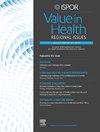Understanding What Matters: Stakeholder Views on Decision Criteria for Cancer Drug Selection in the Public Sector in Malaysia
IF 1.4
Q3 HEALTH CARE SCIENCES & SERVICES
引用次数: 0
Abstract
Objective
This study aimed to determine stakeholders’ decision criteria preferences for formulary decisions of cancer drugs in the Ministry of Health. The secondary objective was to identify the outcome measures of interest for assessment of clinical benefits for cancer drugs.
Methods
A survey questionnaire was administered online and as hard copy using purposive sampling to 32 healthcare facilities providing cancer services and the Formulary Management Branch in the Ministry of Health. Respondents reported whether a criterion “will be considered” and weighted its relative importance on a 5-point scale. The choice of safety and efficacy/effectiveness outcomes were ranked from 1 to 5, and the minimum value of benefit for the efficacy/effectiveness outcome ranked 1 was provided. Trade-offs between survival and quality of life were also explored. Inferential statistics were used to explore difference in responses.
Results
A total of 316 healthcare professionals responded to the survey. The most important criteria for value assessment of cancer drug were safety and effectiveness. Other criteria deemed important were quality of evidence, disease severity, and patient-reported outcomes. There was no difference in the criteria preference and weights across the various respondent groups. Overall survival was the most preferred clinical benefit outcome. Overall, willingness to pay was higher for life-prolonging treatment than treatment that improved quality of life.
Conclusions
This study revealed that a wide range of criteria beyond the traditional decision-making criteria of efficacy, safety, and cost-effectiveness are important for value assessment of cancer drugs for the purpose of formulary decisions.
了解重要的事情:马来西亚公共部门利益相关者对癌症药物选择决策标准的看法》(Understanding What Matters: Stakeholder Views on Decision Criteria for Cancer Drug Selection in the Public Sector in Malaysia)。
研究目的本研究旨在确定卫生部在制定抗癌药物处方时利益相关者的决策标准偏好。次要目标是确定评估抗癌药物临床疗效的相关结果指标:通过有目的的抽样调查,对 32 家提供癌症服务的医疗机构和卫生部处方管理科进行了在线和硬拷贝调查问卷。受访者报告是否 "会考虑 "某项标准,并按 5 分制对其相对重要性进行加权。对安全性和疗效/有效性结果的选择从 1 到 5 分进行排序,并提供了疗效/有效性结果的最小效益值(排序为 1)。此外,还探讨了生存期和生活质量之间的权衡。采用推断统计法探讨了回答的差异:共有 316 名医护人员对调查做出了回应。癌症药物价值评估的最重要标准是安全性和有效性。其他被认为重要的标准包括证据质量、疾病严重程度和患者报告结果。不同受访者群体对标准的偏好和权重没有差异。总生存期是最受青睐的临床获益结果。总体而言,延长生命治疗的支付意愿高于改善生活质量的治疗:这项研究表明,除了传统的疗效、安全性和成本效益等决策标准外,其他广泛的标准对于为制定处方而对癌症药物进行价值评估也很重要。
本文章由计算机程序翻译,如有差异,请以英文原文为准。
求助全文
约1分钟内获得全文
求助全文
来源期刊

Value in health regional issues
Pharmacology, Toxicology and Pharmaceutics-Pharmacology, Toxicology and Pharmaceutics (miscellaneous)
CiteScore
2.60
自引率
5.00%
发文量
127
 求助内容:
求助内容: 应助结果提醒方式:
应助结果提醒方式:


